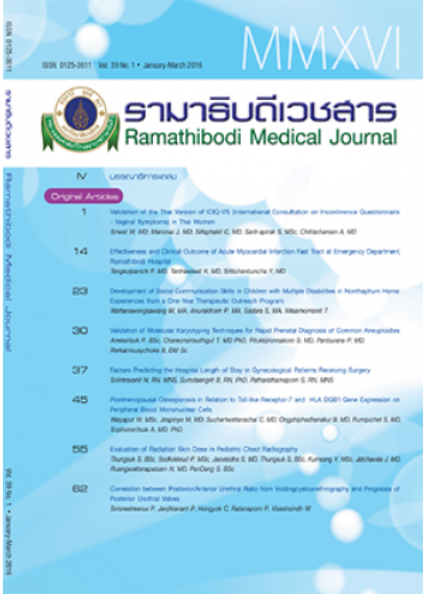Validation of the Thai Version of ICIQ-VS (International Consultation on Incontinence Questionnaire -Vaginal symptoms) in Thai Women
Keywords:
ICIQ-VS questionnaire, Pelvic organ prolapse, Vaginal symptomAbstract
Objective: To determine the psychometric properties of the Thai version of international Consultation on Incontinence Questionaire-Vaginal Symptoms (ICIQ-VS).
Methods: This was a cross-sectional, observation study. Women who attended the urogynecology clinic, whether or not they complaining of vaginal symptoms were enrolled. Participants completed the Thai version of ICIQ-VS before being examined by the gynecologists according to the Pelvic Organ Prolapse Quantification system. About 2 weeks later, the participants who had no treatment returned to the clinic for completion of the retest questionnaire.
Results: Eighty-six women with a mean age of 54.4 years were recruited. The final Thai version of ICIQ-VS questionnaire was developed. It demonstrated good psychometric properties (validity and reliability). With regard to the construct validity, there were statistically significant difference between the symptomatic group (ICIQ-VS 5a > 0) and the asymptomatic group (ICIQ-VS 5a = 0) assessed by vaginal symptom score (VSS) (P < 0.001), sexual matter score (SMS) (P < 0.001) and quality of life (QoLS) (P < 0.001). The test-retest reliability was considered moderate to excellent for all questions.
Conclusion: The Thai version of ICIQ-VS was successfully validated and could assess the severity of pelvic organ prolapse according to the questionnaire score.
References
Swift S, Woodman P, O'Boyle A, et al. Pelvic Organ Support Study (POSST): the distribution, clinical definition, and epidemiologic condition of pelvic organ support defects. Am J Obstet Gynecol. 2005;192(3):795-806.
Whitcomb EL, Rortveit G, Brown JS, et al. Racial differences in pelvic organ prolapse. Obstet Gynecol. 2009; 114(6):1271-7.
Slieker-ten Hove MC, Pool-Goudzwaard AL, Eijkemans MJ, Steegers-Theunissen RP, Burger CW, Vierhout ME. The prevalence of pelvic organ prolapse symptoms and signs and their relation with bladder and bowel disorders in a general female population. Int Urogynecol J Pelvic Floor Dysfunct. 2009;20(9):1037-45. doi:10.1007/s00192-009-0902-1.
Chuenchompoonut V, Bunyavejchevin S, Wisawasukmongchol W, Taechakraichana N. Prevalence of genital prolapse in Thai menopausal women (using new standardization classification). J Med Assoc Thai. 2005;88:1-4.
Piya-Anant M, Therasakvichya S, Leelaphatanadit C, Techatrisak K. Integrated health research program for the Thai elderly: prevalence of genital prolapse and effectiveness of pelvic floor exercise to prevent worsening of genital prolapse in elderly women. J Med Assoc Thai. 2003;86:509-15.
Digesu GA, Chaliha C, Salvatore S, Hutchings A, Khullar V. The relationship of vaginal prolapse severity to symptoms and quality of life. BJOG. 2005;112(7):971-6.
Price N, Jackson SR, Avery K, Brookes ST, Abrams P. Development and psychometric evaluation of the ICIQ Vaginal Symptoms Questionnaire: the ICIQ-VS. BJOG. 2006;113(6):700-12.
Tamanini JT, Almeida FG, Girotti ME, Riccetto CL, Palma PC, Rios LA. The Portuguese validation of the International Consultation on Incontinence Questionnaire-Vaginal Symptoms (ICIQ-VS) for Brazilian women with pelvic organ prolapse. Int Urogynecol J Pelvic Floor Dysfunct. 2008;19(10):1385-91. doi:10.1007/s00192-008-0641-8.
Banerjee C, Banerjee M, Hatzmann W, et al. The German version of the 'ICIQ Vaginal Symptoms Questionnaire' (German ICIQ-VS): an instrument validation study. Urol Int. 2010;85(1):70-9. doi:10.1159/000316337.
Bump RC, Mattiasson A, Bø K, et al. The standardization of terminology of female pelvic organ prolapse and pelvic floor dysfunction. Am J Obstet Gynecol. 1996;175(1):10-7.
Barber MD, Neubauer NL, Klein-Olarte V. Can we screen for pelvic organ prolapse without a physical examination in epidemiologic studies? Am J Obstet Gynecol. 2006;195(4):942-8.
Guillemin F, Bombardier C, Beaton D. Cross-cultural adaptation of health-related quality of life measures: literature review and proposed guidelines. J Clin Epidemiol. 1993;46(12):1417-32.
Digesu GA, Khullar V, Cardozo L, Robinson D. Inter-observer reliability of digital vaginal examination using a four-grade scale in different patient positions. Int Urogynecol J Pelvic Floor Dysfunct. 2008;19(9):1303-7. doi:10.1007/s00192-008-0635-6.
Hagen S, Glazener C, Sinclair L, Stark D, Bugge C. Psychometric properties of the pelvic organ prolapse symptom score. BJOG. 2009 Jan;116(1):25-31. doi:10.1111/j.1471-0528.2008.01903.x.
Cam C, Sancak P, Karahan N, Sancak A, Celik C, Karateke A. Validation of the short form of the Pelvic Organ Prolapse/Urinary Incontinence Sexual Questionnaire (PISQ-12) in a Turkish population. Eur J Obstet Gynecol Reprod Biol. 2009;146(1):104-7. doi:10.1016/j.ejogrb.2009.05.016.
Hashim H, Avery K, Mourad MS, Chamssuddin A, Ghoniem G, Abrams P. The Arabic ICIQ-UI SF: an alternative language version of the English ICIQ-UI SF. Neurourol Urodyn. 2006;25(3):277-282. doi:10.1002/nau.20212.
Downloads
How to Cite
Issue
Section
License
Copyright (c) 2016 By the authors. Licensee RMJ, Faculty of Medicine Ramathibodi Hospital, Mahidol University, Bangkok, Thailand

This work is licensed under a Creative Commons Attribution-NonCommercial-NoDerivatives 4.0 International License.












